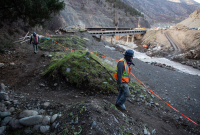Support strong Canadian climate journalism for 2025
Walking into Bushwakker Brewpub during a lunch−hour rush, Darlene Woywoda looked for the vaccinated section.
Woywoda, 69, was meeting some friends, and they decided to dine in the Arizona Room — a 50−seat space reserved for guests who are fully immunized against COVID−19.
The feeling for Woywoda was reminiscent of the days when hostesses would greet diners with the phrase, "Smoking or non−smoking?" before cigarettes were banned from restaurants.
"My husband and I were talking that businesses will have to do something like that with COVID−19 vaccinations," Woywoda said.
"Except the smoke can infiltrate from one area to another, whereas here (the air) is more contained."
The Arizona Room at Bushwakker Brewpub was once a space reserved for birthday and retirement parties, but then the COVID−19 pandemic hit. Customers no longer wanted to gather in big groups, said bar manager Grant Frew.
The room is now for the exclusive use of the fully vaccinated — despite Saskatchewan ending its vaccine passport requirement on Feb. 14.
Perks in the Arizona room include private washrooms, servers who are also fully vaccinated, and a ventilation system separate from the restaurant’s main room, which can seat another 200 people both vaccinated and non−vaccinated.
"I’ve been told to never introduce politics and religion into a bar, but inadvertently that has seemed to happen, which has sparked quite a bit of controversy," Frew said in an interview.
Bushwakker introduced the separate section after longtime customers of the 31−year−old brew pub said they wouldn’t return for a while after the province did away with its vaccine passport.
"When I heard that, well, it didn’t make me feel very good obviously. We’re trying to dig ourselves out of this economic catastrophe that the pandemic has caused to the entire hospitality sector," Frew said.
"We thought why don’t we create this space where they can feel safe, and comfortable, because that’s always first and foremost what we want to do."
The president of the Saskatchewan Hotel and Hospitality Association says the move is a good idea.
"Every operator has to make decisions that are in the best interest of their business," said Jim Bence, who said Bushwakker Brewpub is, as yet, unique in its approach.
"Bushwakker is responding to what their customers are telling them and adapting their model to fill that need."
While most people have praised the pub’s decision, Frew said there has been pushback online. People have suggested the business is segregating people or accusing the brew put of creating division.
"That is not the case at all. This is simply a room we wanted to provide for those with health concerns. It’s a temporary measure. Segregation and division was not our intention," said Frew, who added that unvaccinated patrons can still dine in the main room.
The Brewhouse is likely to keep its policy in place for a few more months, he said. Saskatchewan is preparing to lift its mask mandate on Feb. 28 and will no long required those who test positive for COVID−19 to isolate.
Nazeem Muhajarine, an epidemiologist at the University of Saskatchewan, said many customers are looking for alternatives now that government policy no longer mandates that vaccination status be shown.
"It’s a workaround," he said.
"They’re not comfortable mixing yet with people who are not vaccinated, and they still don’t want to get (the) Omicron (variant), even if it may be less severe than Delta."
Fully vaccinated sections or not, Muhajarine said, people can still reduce their risk of catching COVID−19 while dining out by sticking to the basics: wear a mask, test yourself before going out and stay home if sick.
For her part, Woywoda said she loves the room for the fully vaccinated and is encouraging other businesses to do the same.
"This just alleviates all of our concerns."
This report by The Canadian Press was first published Feb. 21, 2022.




Comments
This is an excellent idea on the part of the pub. But it's not a solution; public health requires public action. This is fine for the psychological health of vaccinated people who are anxious about exposure, and may help them not get infected. But note that 80%-plus of the population are vaccinated, while the "vaccinated people" room is about 1/4th or 1/5th of the total size of the place. So in the main room, vaccinated and unvaccinated people will be mixing, and perhaps even more importantly, unvaccinated people will be mixing with and infecting each other.
Treating "risking infection" as a personal choice in the marketplace means infection gets to spread, hospitals get to get overwhelmed, operations and cancer treatments get postponed and so on. And just incidentally, the latest variant from Omicron seems to spread as fast as Omicron but is more severe. So much for the virus just going away. Scott Moe is an amoral fool.
Why would the vaccinated people be anxious? Is that not the reason they got vaccinated in the first place.........so they could go out and about without the fear of catching covid? So, why get vaccinated if you still live in fear? Aren't the symptoms for the vaccinated milder when they get the virus, so should it not be the unvaccinated that should be more concerned about being around the vaccinated ? This article makes it sound like vaccinated people should be afraid of the unvaccinated ,? That is backwards, since the unvaccinated will have much stronger symptoms and are then much more likely to keep home than the vaccinated people who have covid but only mild symptoms .They just continue freely going out and spreading it all over because they don't feel all that bad, yet they are just as contagious as the unvaccinated.
There are lots of reasons that many people will stay unvaccinated, and they should not be treated like they are dangerous or toxic .
there was pushback against smoking restrictions at the time but eventually the community accepted that smokers needed to be separated from non-smokers/children/ill for everyones' health. Today it is not an issue. The same will have to happen with COVID. There will be pushback by the minority but eventually their voices will be drowned out by the more sensible/community-minded vaccinated. Keeping the passports in place is for the good of all society.
However you parse it, segregating the vaxxed and unvaxxed can only be a form of discrimination; which has become a multi-syllabic four letter word in this era - instead of a word denoting considered choice.
Choice as we all know now is intimately associated with the "abomination" of abortion. The ability to choose is not at all encouraged by the self-righteous prigs who believe all people (especially uppity women) should hew to the stringent lines of evangelical christianity. (I deliberately do not capitalize evangelical christianity as I can only consider it a bastardized version of one of the always problematical religions that relies entirely on hierarchical patriarchy, including the gender of its god.). (I've strayed a long way from vaccines and choice) My point being that the old demon of gender non-parity lies like a rotting stench over most of human life. We need an explosively strong wind to blow it to smithereens and introduce some fresh air.
Bad idea! The purpose of the vaccination is not to prevent everybody from catching the disease - it is to reduce the probability that the vaxer will catch it and to reduce its severity. If everybody got vaccinated, the net result should be fewer people in hospital, in ICU, or dying. If you put all the non-vaxers in one room, you will increase the probability of catching the disease for every person in that room, as well as the probability of increased severity in all cases. By concentrating all the non-vaxers in one area, you may actually end up with more cases, with higher severity, than if you just let the vaxers and non-vaxers mingle. (I haven't done the modelling - maybe someone should give it a try!)
Bad idea! The purpose of the vaccination is not to prevent everybody from catching the disease - it is to reduce the probability that the vaxer will catch it and to reduce its severity. If everybody got vaccinated, the net result should be fewer people in hospital, in ICU, or dying. If you put all the non-vaxers in one room, you will increase the probability of catching the disease for every person in that room, as well as the probability of increased severity in all cases. By concentrating all the non-vaxers in one area, you may actually end up with more cases, with higher severity, than if you just let the vaxers and non-vaxers mingle. (I haven't done the modelling - maybe someone should give it a try!)